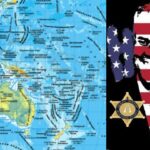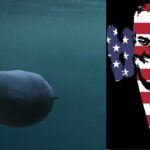“A Sign of Weakness and Desperation”: Former ADF Major Cameron Leckie on AUKUS

“AUKUS is a sign of desperation or weakness, because you can’t understand the United States, without acknowledging that it’s an empire. All empires have a lifecycle. And the US is currently in decline.”
For most Australians, the prime minister’s announcement that our nation has formed a new pact with the US and the UK, known as AUKUS, came as a complete shock, especially as war on China is its primary agenda.
During the 16 September announcement, Scott Morrison was beaming as he unveiled a key component of the Anglosphere alliance, which involves our nation going nuclear in the form of eight submarines, which will be assembled with technology shared by the US.
But it didn’t stop there. The PM then took a jaunt to the States, where he not only took part in blowing the AUKUS trumpet, but also met with the other leaders of the Quad: the US, Japan and India. This is another strategic alliance, which, although denied, also has China as its focus.
US war on China rhetoric has been building up for years. And the same talk has been escalating within the ranks of the Morrison government since it’s been in office. However, the front and centre positioning of Australia in this latest upsurge in war posturing has come as somewhat of a surprise.
Rising rhetoric
For its part, the Chinese Communist Party didn’t take too kindly to our PM overtly colluding with other countries against the East Asian nation, which continues to be Australia’s largest trading partner.
CCP mouthpiece the Global Times stated in an editorial on the day of the AUKUS announcement, that “Australia has turned itself into an adversary of China”, and if it continues to provoke it, “China will certainly punish it with no mercy”.
Yet, this didn’t stop former Australian PM Tony Abbott making his way over to Taiwan on 8 October to deliver a speech at the Yushan Forum, in which he accused Beijing of being a regional “bully”, who’s beating the “drums of war”.
Of course, China, like all nations, is no innocent. The cultural genocide against the people of Tibet, as well as that being perpetrated upon the Uyghur people, has been escalating since the mid-1950s, which was long before the US ever raised them as a reason to go to war.
Indeed, these human rights crises should be a focus on the international arena to be dealt with in a less globally catastrophic manner.
A military perspective
Former Australian Defence Force Major Cameron Leckie is a vocal opponent of war with China and the campaign towards it.
Today, an agricultural engineer, Leckie spent 24 years as part of our nation’s military, having been allocated to the Royal Australian Corps of Signals.
Leckie makes clear that he is not an antiwar commentator. He believes in the need for an equipped and trained military.
But, in his opinion, our nation’s current foreign policy is “insane”, and he’s being forthright with his views about it because, as he puts it, “the track we’re going down is literally crazy”.

Sydney Criminal Lawyers spoke to Cameron Leckie about the declining US Empire, why Canberra is so wilfully placing itself in direct opposition to Beijing, and how an independent defence strategy, like Vietnam’s, is the way forward.
The prime minister recently dropped it on the nation that we’re now part of a new pact, known as AUKUS, which has China as its chief concern, and involves our country going nuclear in the form of eight submarines.
Cameron, given your experience, how did this announcement read?
AUKUS is a sign of weakness and desperation, more than anything else. All we have is the announcement that it’s happening, with the submarines as a big part of it.
But, as former ministerial adviser to the defence minister Mike Scrafton has said, the more important part is the basing arrangements and access to Australian facilities for the US. The submarines are a smokescreen.
I say AUKUS is a sign of desperation or weakness, because you can’t understand the United States, without acknowledging that it’s an empire. All empires have a lifecycle. And the US is currently in decline.
The United States is in an existential crisis – or close to it – when it comes to China and Russia, because those two countries combined are on the up, while the US is on the down.
The US has switched its focus slightly from Russia to China. And it’s trying to do everything in its power to maintain its global hegemony, but it’s already too late. It still has a lot of power, but it can’t exercise it like it did 20 years ago.
AUKUS is one method to try and slow down the decline of empire. As the US sees it, containing China allows them to try and maintain their global hegemony for the foreseeable future. But it’s too late for that. It’s a desperate attempt.
The evidence for that is the French are the oldest ally of the United States. France was a major supporter of the US during the revolutionary war. And they’ve now been betrayed.
They’ll patch things up and it will look good. But what it shows is even the closest countries to the imperial core of the United States are now being ditched when it doesn’t suit the purpose of the US.
AUKUS was not the first instance of war posturing against China. The war rhetoric has been building up over the last few years.
In June, you wrote in Independent Australia that “few Australians have any real conception of the consequences of a war with China”.
Can you expand on what those consequences are?
The way we’ve gone to war for as long as most Australians have been alive is we have a standing defence force, which we deploy in an operation somewhere. So, people go on a six, eight or twelve month deployment and then return home.
In Iraq and Afghanistan, there were casualties. People were killed and there was fighting involved. But you had very little impact on Australia, our economy or on our society.
When there are casualties, they will make the news and are discussed. But, other than that, unless you were directly involved, it really didn’t impact society at all.
Whereas we are so reliant on China that, if we go to war with that country, we’re basically shooting ourselves in the foot.
The last time I checked, over half of our aviation fuels are diesel, and well over half of our imported oil products come from China or countries on the perimeter of the South China Sea.
So, if we have a conflict in and around China and Taiwan, all the oil tankers are going to stop. There is no way that merchant shipping companies are going to send their vessels into a war zone, and the Australian economy would come to a standstill within a couple of weeks.
Now, that’s just for imported fuel products. If you think about every other product that we rely upon from China, our systems would start to break down very quickly. If you go to a lot of shops in Australia and look at where things are made, a lot of it is made in China.
That’s just the economic perspective. But then there’s the military perspective. If we were involved in war with China, it would be mostly naval and air force elements because an invasion of that country seems highly unrealistic.
There will be mass casualties. Our navy and the United States navy would take a huge amount of casualties.
If a single ship goes down, it’s a couple of hundred people in an instant. If we do that, we are going to have several of those ships sunk in a pretty short period. And we will have suffered the biggest military disaster since World War Two.
Then there’s the prospect that Australia will be directly struck. We’ve got US military bases. So, with some of China’s longer range ballistic missiles or submarine-launched missiles, we could find ourselves suffering a physical attack.
The nature of war that we’ve known for the last fifty or sixty years will change quickly. And I don’t think we’re discussing that or understanding what war with China is likely to be.
A week after the AUKUS announcement, Morrison was over in the States not only spruiking the new pact but was also in discussions involving the Quad strategic alliance, which involves the US, Japan and India.
In your understanding, how has it come to the point that our nation is central to both these regional threats against our largest trading partner?
A lot of it comes because of cognitive dissonance, as the people in power are starting to realise that the United States is an empire in decline.
And the political leadership in Australia doesn’t have the ability to comprehend a world where our ally is not the dominant power that we’ve trusted for our security.
Australia has invested all this effort into our security being reliant on the United States. And our leadership hasn’t come to terms with this situation.
That’s the background, and there are a couple of specifics. There are certain power groups in the United States, the UK and Australia, who see the China threat as quite useful. And these groups have been very effective.
Over the last couple of years, if you look at the polling as to how Australians view China, that view has turned negative.
That’s not necessarily because of what China has been doing, but it’s part of the campaign launched against China by the United States, and willingly supported by Australia and the United Kingdom.
It’s what US journalist Patrick Lawrence calls “the power of leaving out”. That means the context and details are left out, so there’s no understanding of what’s actually going on, as they continue to target China.
The Uyghur problem in Xinjiang appears to be massively overstated, when you look at what is happening in Kashmir or Palestine, which is largely ignored or rarely seen. But they continually harp on about China’s misdeeds.
A key organisation for all of this is the Australian Strategic Policy Institute or ASPI. It’s primarily funded by the Australian government, but it’s also funded by the UK government, the US government and a large number of arms manufacturers.
It’s like a circular argument. ASPI is commissioned to do some work. They then release their report, which is published in the international media, where it’s presented as an independent validation of what the Americans are reporting, without any indication of who’s actually funding the work.
ASPI has an enormous influence on Australian foreign policy. It’s largely displaced DFAT in the discussion on foreign policy and how we address the rise of China and the ongoing issues that the United States has.
All of ASPI’s publications come down to every problem being fixed by more defence spending, whether that be ships, new aircraft or new facilities.
It always comes down to the same answer. And why is that? Because it’s what their sponsors want. They get the benefit of that.
ASPI is a massive cause of how we got to this point in Australia.
Former PM Tony Abbott was over in Taiwan two weeks ago, expressing solidarity with Taipei against Beijing’s claims over its region.
This was only four days after China flew 150 warplanes close by the island nation and president Xi has since made further assertions over Taiwan.
But in the overall build up of war talk on both sides, you maintain that Beijing is not the aggressor. Can you speak on why this is the case?
First of all, Taiwan is not a country. Virtually no other countries recognise Taiwan as being an independent country, including some of the most belligerent nations against China, like the United States and Australia. They all recognise Taiwan as part of China.
The Chinese aircraft manoeuvres are an example of what I mentioned before in terms of the power of leaving out. The only newsworthy thing about this whole event was the size.
It was the largest manoeuvre of China’s aircraft to date, and it indicates the increasing sophistication of their airpower.
But what they actually flew into was Taiwan’s self-declared Air Defence Identification Zone. That zone has no standing in international law. And it actually incorporates a far whack of China. There’s something like 100 million Chinese living in parts of the Taiwanese air zone.
The Taiwanese have produced maps of where the Chinese aircraft flew, and they didn’t fly at Taiwan. They flew in between Taiwan’s main island and some of its outposts.
The other thing that hasn’t been mentioned is that at the same time this was occurring, there was a major naval manoeuvre in the Philippine Sea.
As a number of commentators suggest, this whole activity was targeted more at the United States, the UK, and the other countries participating in the naval manoeuvres in the Philippine Sea, than it was at Taiwan.
Yet, you don’t see that reported at all in our media. So, without the whole picture, the layperson takes it as aggression from China, when it is a pretty long bow to come to that conclusion.
In the South China Sea itself, China’s claims are excessive. But I understand why the Chinese have militarised those islands and outposts.
That’s because of their history with the century of humiliation which began with the barbarians – the French and the British – attacking China from the sea, with all sorts of untold damage to China, which lasted for many decades.
So, they’ve got an historical memory there.
The second thing is the Chinese are well aware of the American strategy of trying to contain them, and a major part of that strategy is its potential to blockade China, with the ten or eleven carrier battle groups that the United States has, plus their submarine fleet.
So, by extending their defence perimeter out to these islands, what they can do is reduce, prevent or minimise the ability of the United States navy or air force to actually strike China.
Primarily, China’s actions in the South China Sea are defensive. If I was a Chinese strategist, I would do the same thing because the biggest threat to China is the US navy.
So, what do you do? You make sure that the United States navy is forced to stay as far away from your country as possible.
As you’ve just mentioned, the US and its allies just held two weeks of war exercises in the South China Sea. Other nations involved included the UK, Canada, New Zealand, Japan, the Netherlands and Australia.
This show of force, coupled with all the other recent developments we’ve been discussing reads like a rapid escalation in matters.
Do these war games mark a further acceleration? Should we be concerned here?
It’s a bit of yes and a bit of no. These activities have been going on for decades. From that perspective, it’s not necessarily a change.
But it’s all the rhetoric surrounding these activities, which is where the real change is.
This rhetoric is all part of the United States containment strategy towards China.
The United States has written down in documents, like the Indo Pacific Strategic Framework, that their objective is to maintain primacy in the Indo Pacific region. And for them to maintain this primacy means bringing China down.
So, it is quite aggressive. Freedom of navigation operations are part of their strategy. There are 400-odd US military bases surrounding China. That’s all part of that strategy.
Most of these issues have some legitimacy in the start. What the United States does is it goes in and funds opposition groups, like the National Endowment for Democracy.
The US trains people. It supports them. It finds them funding and equipment. And then you end up with things like the Hong Kong riots and tensions with Taiwan.
This containment strategy is extremely dangerous. But China is the land of Sun Tzu, so they’ll be patient. They play the long game.
But the biggest risk at this point is there will be a miscalculation on either side that will result in a war, and once the conflict starts that’s the last time we will really have any control over events.
Once it all starts, no one knows where it will go, how bad it will get, but we will be in for a pretty torrid time.
And lastly, Cameron, the strategic developments we have been discussing don’t happen overnight. They come after long periods of build-up and planning.
As a campaigner against conflict with China, what would you like to see happen from here? And further, what do you consider we’ll likely see?
I’ll start with what we’ll likely see. Australia has boxed itself into a lose-lose situation. If the United States containment strategy with China – which Australia is supporting – is successful, we’ve undermined the major engine of global growth, perhaps permanently.
On the other hand, if that containment strategy results in war, well, we’ve spoken about the outcomes of that, and it’s not going to be in our interests either.
The most likely outcome will be that the United States will continue to decline. It’s influence over the world will continue to decline. And Australia is going to find itself increasingly isolated.
We will have doubled down with our major ally in its time of decline and undermined our future prosperity by making China an enemy, even though it’s our largest trading partner.
We will find ourselves in a very difficult position and it will be very much of our own making.
What would I like to see happen? First of all, we need war powers legislation. I’m a member of Australians for War Powers Reform.
We need to have a vote in parliament before we send troops overseas. And that’s on past experience where we’ve done it based on lies and half-truths, such as with Iraq, and for reasons like supporting the US alliance, which hasn’t done our country any favours.
I would also like to see the Australian Strategic Policy Institute disbanded or its funding cut so that foreign entities can’t fund it.
Alternatively, it could become a private venture, and have no relation to the Department of Defence or the Australian government.
From our defence strategy position, Australia should adopt an independent defence strategy, which is entirely feasible and affordable.
There are a number of people with far more experience than myself – such as Dr Albert Palazzo, who recently retired from the Australian Army Research Centre – that advocate for an independent defence policy.
Vietnam is an example of that. Vietnam borders China. It has been invaded by China multiple times over the centuries. Yet, it has a defence strategy based on what it calls the “Three Nos”: no military bases, no alliances and no aligning against other countries.
The Three Nos forms the basis of Vietnam’s defence strategy. So, if a country that borders China – and is in a far more difficult situation than we are comparatively – can do that, there’s no reason Australia can’t do the same thing.







